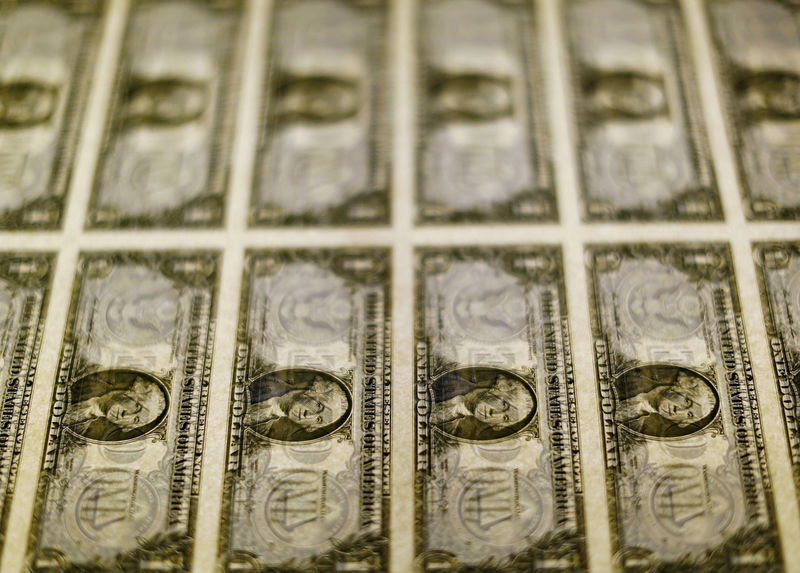Investing.com - The U.S. dollar has started the new week on the back foot Monday, handing back some of the previous week's gains, as traders await the release of key inflation data as well as more comments from Federal Reserve speakers.
At 05:20 ET (09:20 GMT), the Dollar Index, which tracks the greenback against a basket of six other currencies, traded 0.2% lower at 104.010, having recorded a weekly gain of nearly 1% last week.
Fed’s favored inflation gauge in focus
The greenback has seen some consolidation at the start of the week, falling slightly from a one-month high, after last week’s dovish signals from the Swiss National Bank and Bank of England suggested that the dollar will remain the only relatively high-yielding, low-risk currency in the near-term.
The Fed did flag the likelihood of 75 basis points of rate cuts this year, but added that this would depend largely on the path of inflation.
This brings the release of the core personal consumption expenditures price index, the Fed’s preferred gauge of underlying inflation, firmly into focus, even though it is due when markets are closed for Good Friday.
The index, which excludes food and energy costs, is forecast to rise 0.3% in February after posting its biggest monthly increase in a year the prior month.
There are a number of Fed officials due to speak this week – including Fed Chair Jerome Powell, Atlanta Fed president Raphael Bostic and Fed governors Lisa Cook and Christopher Waller.
Their comments will also be studied carefully as the market seeks clues over the path for policy interest rates, including the likelihood of the central bank starting to cut rates in June.
Sterling, euro recover slightly
In Europe, GBP/USD gained 0.1% to 1.2614 and EUR/USD rose 0.1% to 1.0818, with both pairs rebounding slightly after last week’s sharp losses against the dollar.
Bets for a June rate cut by the European Central Bank and the Bank of England have risen substantially after the Swiss National Bank became the first major central bank to lower borrowing costs last week and BoE Governor Andrew Bailey told the Financial Times that rate cuts "were in play" this year.
Additionally, Bundesbank President Joachim Nagel said late last week that the ECB may be in a position to cut interest rates before the summer recess, possibly in June, as inflation is on its ways back to the bank's 2% target.
Europe has its own inflation tests this week with consumer price data out from France, Italy, Belgium and Spain, ahead of the overall eurozone CPI report next week.
Yen receives verbal support
USD/JPY traded 0.1% lower at 151.28, with the yen receiving some support after a top Japanese currency diplomat offered a verbal warning on potential intervention by the government.
Masato Kanda, vice finance minister for international affairs, said that recent weakness in the yen did not reflect the currency’s fundamentals, and that the government remained ready to respond to the yen’s slide.
USD/CNY fell 0.2% to 7.2120, after Reuters reported that the People’s Bank of China had instructed state-owned banks to buy yuan and sell dollars in the open market, to support the Chinese currency.
The yuan tumbled to four-month lows in recent sessions amid growing concerns over a sluggish Chinese economy.
Which stock should you buy in your very next trade?
With valuations skyrocketing in 2024, many investors are uneasy putting more money into stocks. Unsure where to invest next? Get access to our proven portfolios and discover high-potential opportunities.
In 2024 alone, ProPicks AI identified 2 stocks that surged over 150%, 4 additional stocks that leaped over 30%, and 3 more that climbed over 25%. That's an impressive track record.
With portfolios tailored for Dow stocks, S&P stocks, Tech stocks, and Mid Cap stocks, you can explore various wealth-building strategies.
